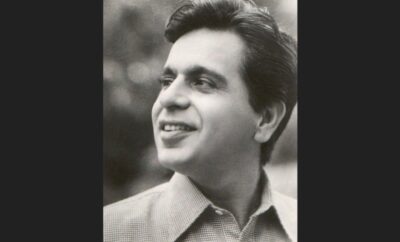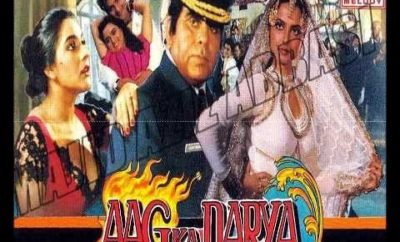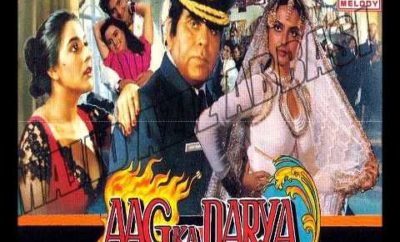Legends
Dilip Kumar – From A Shy Newcomer to Tragedy King
He came up with spellbinding performances in one hit film after another, in his almost six-decade-long career, on the basis of his innovative capability, determination, hard work and never-say-die attitude. His first film was Jwar Bhata (1944). After that, he soon soared to great heights with movies such as Jugnu, Shaheed, Mela, Andaz, Deedar, Daag and Devdas to name a few.
Dilip Kumar, original name Muhammed Yusuf Khan was born on 11th December 1922, Peshawar,British India (now in Pakistan), one of the legendary actors of Hindi cinema whose low-key, naturalistic acting style gave him the ability to excel in a wide range of roles. In addition to acting with restraint, he was noted for his good looks, deep voice, and fine accent. Born into a Pashtun family of 12 children. Dilip Kumar was discovered in 1944 by Devika Rani, who along with her husband owned the famous Bombay Talkies production house. Devika Rani had gone out for shopping to a local market. At one fruit shop, she looked keenly at the young man engrossed at selling his merchandise. It was by mere chance that the shy shopkeeper had only replaced his father that day. Devika Rani found this young man with a sensitive face and expressive eyes quite unusual. Thus he was hired by her for Bombay Talkies. He co-starred with Raj Kapoor in Mehboob Khan’s film Andaz (1949) which catapulted him to stardom.
In his progressing career, he played a string of hapless characters in films such as Deedar (1951), Devdas (1955). His screen persona acquired tragic overtones, and he was known as the “King of tragedy.” He went on to appear in several other hit films like ‘Madhumati’ (1958), ‘Yahudi’ (1958), ‘Mela’ (1948) and several others. He also starred with Dev Anand in the 1955 flick, ‘Insaniyat’, directed by S.S Vasan. Some of his top on-screen pairings are with Kamini Kaushal, Nargis, Vyjayantimala, Meena Kumari and Madhubala. The tragic roles in his early career drove him to depression. He decided to consult a Harley Street specialist and was advised to switch to merrier roles. So he took on positive roles such as Azaad (1955). After that he started taking on lighter roles in films like ‘Kohinoor’ (1960), ‘Aan’ (1952). In 1960, he enacted the character of Prince Salim in the K. Asif’s magnum opus, ‘Mughal-e- Azam’. This film was a blockbuster and it held the record for being the second highest grossing movie in the history of Bollywood. Dilip Kumar produced and acted in a film called ‘Ganga Jamuna’ where he and Nasir Khan, his brother appeared in the lead roles. Dilip Kumar has played urban and rural roles, tragedies and comedies. He also grew as an actor from role to role.
Dilip Kumar has starred in some of the most spectacular films which India has produced, and he became a very successful and popular star of the 1940s, 50s and 60s. He, perhaps subconsciously, revolutionized modern acting. The legendary Bengali filmmaker Satyajit Ray dubbed him as “the ultimate method actor.” His acting technique has been the awe of many of today’s artistes, who probably wish that they could pull off a Dilip Kumar style of performance. Dilip Kumar has inspired great actors like Amitabh Bachchan, Shah Rukh Khan and Aamir Khan, who regularly cite him as their role model.
During the 1970s, Dilip Kumar lost popularity since a wave of new actors like Rajesh Khanna and Amitabh Bachchan came to dominate this particular decade. However, during the 1980s,he made a comeback after a long hiatus with films like Kranti, Shakti and Mashaal which gave him the ideal platform to execute poignant performances as a senior character. He eventually retired from films in the 1990s, with Qila (1998) being the last ever film he starred in, where he plays a negative character.
Dilip Kumar is definitely a pioneer when it comes to the craft of acting. He has effectively popularised the tragedy genre in Hindi cinema during his illustrious career. He has set the foundation for the other actors when it comes to exemplifying intense sorrow on the big screen. His style of acting has given Indian cinema the exact flavour of tragedy. His legacy will be greatly appreciated and revered by future generations to come.



